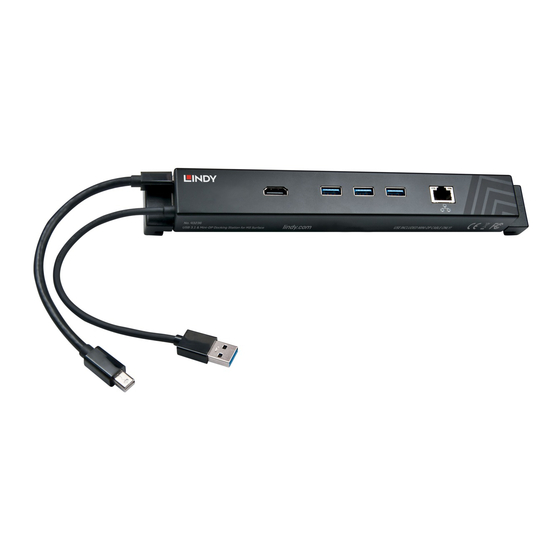
Publicité
Liens rapides
USB 3.1 Tablet Docking
User Manual
Benutzerhandbuch
Manuel Utilisateur
Manuale d'uso
Hersteller / Manufacturer (EU):
LINDY Electronics Ltd.
LINDY-Elektronik GmbH
Sadler Forster Way
Markircher Str. 20
Teesside Industrial Estate, Thornaby
68229 Mannheim
Stockton-on-Tees, TS17 9JY
GERMANY
United Kingdom
Email: info@lindy.com ,
postmaster@lindy.co.uk
T: 0049 (0)621 470050
T: 0044 (0) 1642 754000
No. 43236
For Home and Office Use
www.LINDY.com
Tested to Comply with FCC Standards
© LINDY Group - FIRST EDITION (MAR 2017)
English Manual
Introduction
Thank you for purchasing the USB 3.1 Tablet Docking Station.
This product has been designed to provide trouble free, reliable
operation. It benefits from both a LINDY 2 year warranty and
free lifetime technical support. To ensure correct use, please
read this manual carefully and retain it for future reference.
Station
This USB 3.1 Tablet Docking Station is attached to your tablet
stand or Ultrabook display with a stretching bracket which holds
English
it in place and allows convenient connection of several USB
Deutsch
peripherals, an HDMI display and Gigabit Ethernet to your tablet
Français
or Ultrabook.
Italiano
Package Contents
•
LINDY USB 3.1 Tablet Docking Station
•
Mini-DP cable
•
This Manual
Features
•
Host Interface: Mini-DP cable and USB 3.1 Gen 1/USB 3.0
USB Type A cable
•
HDMI 4K Ultra HD output supports resolutions up to
3840x2160 @ 30 Hz (24bit RGB)
•
3 port USB 3.1 Gen 1/USB 3.0 SuperSpeed (5 Gbps)
Type A hub
•
RJ-45 Gigabit Ethernet port 10/100/1000Mbps
•
DC 5V power jack (3.5/1.35mm) for optional power supply
•
Includes stretching bracket (24.5 to 32cm) to fix on tablet
stands (i.e. Surface Pro) or Ultrabooks of max. 2.7mm
thickness
Installation & Operation
Connect the Docking Station to your Tablet/Ultrabook using the
supplied USB and Mini-DP cables. The required drivers will be
automatically downloaded from the internet.
Then connect your monitor to the HDMI port on the docking
station using an appropriate HDMI cable. Use a standard RJ45
Ethernet cable to connect the docking station to your network.
Up to three USB devices can be connected to the Docking
Station using standard USB cables, a 5V power supply (not
included) may be attached if required when using USB
peripherals with high power requirements.
Deutsches Benutzerhandbuch
Einführung
Wir freuen uns, dass Ihre Wahl auf ein LINDY-Produkt
gefallen ist und danken Ihnen für Ihr Vertrauen. Sie können
sich jederzeit auf unsere Produkte und einen guten Service
verlassen. Diese USB 3.1 Tablet Docking Station unterliegt
einer
LINDY
Herstellergarantie
lebenslangem, kostenlosen technischen Support. Bitte lesen
Sie diese Anleitung sorgfältig und bewahren Sie sie auf.
Diese USB 3.1 Tablet Docking Station wird mit einer
ausziehbaren
Klammer
an
Ihrem
Ultrabookdisplay befestigt und verbindet so Ihr Tablet oder
Ultrabook
mit
mehreren
externen
gleichzeitig.
Lieferumfang
•
LINDY USB 3.1 Tablet Docking Station mit fest
montiertem USB A Kabel und Mini-DP Kabel
•
Dieses Handbuch
Eigenschaften
•
Host-Interface: Mini-DP Kabel und USB 3.1 Gen 1/USB
3.0 mit fest montiertem USB 3.0 A Kabel
•
HDMI Ausgang bis 4K UHD 3840 x 2160 @ 30 Hz
•
USB 3.1 Gen 1/USB 3.0 SuperSpeed (5 Gbit/s) Hub, 3
Ports Typ A
•
RJ45 Gigabit Ethernet-Anschluss 10/100/1000Mbit/s
•
DC 5V Anschluss für optionales Netzteil (nicht enthalten)
•
Mit ausziehbarer Klammer (von 24,5 bis 32cm), die am
Tablethalter (z.B. Surface Pro) oder Ultrabook-Display
(max. Dicke 2,7mm) befestigt wird
Installation & Betrieb
Schließen Sie die Docking Station mit den beiliegenden USB-
und Mini-DP-Kabeln an Ihr Tablet oder Ultrabook an. Die
aktuellen Treiber werden automatisch herunter geladen.
Schließen Sie dann Ihren Monitor mit einem geeigneten
HDMI-Kabel am HDMI-Port der Docking Station an und
verbinden Sie mit einem Netzwerkkabel Ihre Docking Station
mit dem Ethernet. Darüber hinaus können Sie mit einem USB
3.0 Typ A Kabel bis zu drei USB-Geräte anschließen. Sollten
Sie Geräte mit hohem Stromverbrauch nutzen, können Sie
optional ein Netzteil anschließen.
von
2
Jahren
und
Tablethalter
oder
Peripheriegeräten
Publicité

Sommaire des Matières pour Lindy 43236
- Page 1 This product has been designed to provide trouble free, reliable gefallen ist und danken Ihnen für Ihr Vertrauen. Sie können operation. It benefits from both a LINDY 2 year warranty and sich jederzeit auf unsere Produkte und einen guten Service free lifetime technical support.
- Page 2 LINDY Herstellergarantie – Hinweis für Kunden in Deutschland Connectez la Docking Station à votre Tablette/Ultrabook en LINDY gewährt für dieses Produkt über die gesetzliche Regelung in Deutschland hinaus eine zweijährige Herstellergarantie ab Kaufdatum. Die detaillierten Bedingungen dieser Garantie finden utilisant les câbles USB et Mini-DP fournis. Les pilotes requis Collegate la Docking Station al Tablet/Ultrabook tramite i Sie auf der LINDY Website aufgelistet bei den AGBs.




